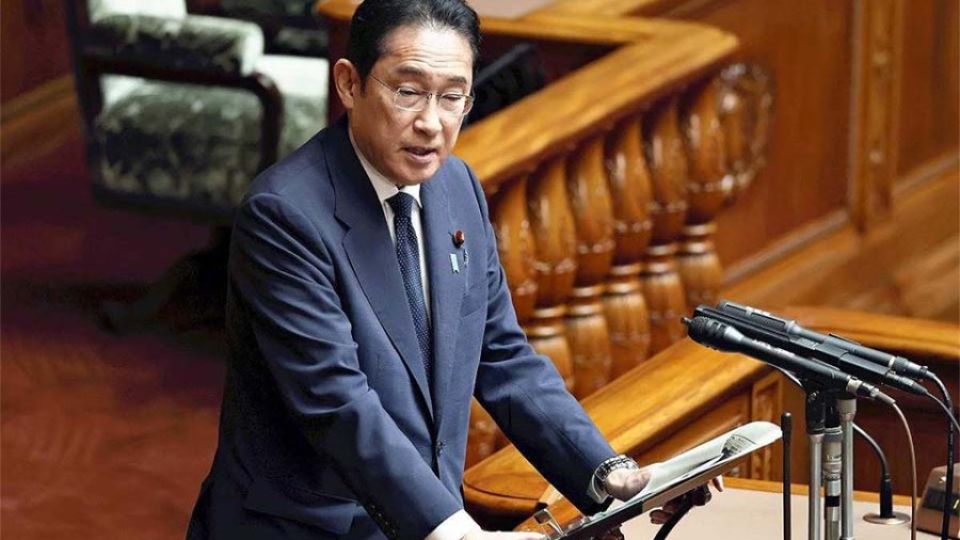September 25, 2024
JAKARTA – Like previous leaders, whoever replaces Japanese Prime Minister Fumio Kishida on Oct. 1 will struggle to convince the Japanese public to support an amendment to the Pacific Constitution, parts of which appear obsolete amid Japan’s military build-up in response to a more assertive China, the nuclear threat from North Korea and Russia’s invasion of Ukraine.
Kishida’s predecessor Shinzo Abe, who ruled in 2006-2007 and 2012-2020, wanted to amend the Constitution but was unable to do so.
In April 2022, Abe renewed his call for the nation to amend the Constitution.
“Up until now the public never had the chance to express their intention on the Constitution, whether they are for or against it. It is absolutely strange,” he said. “It is about time we changed the Constitution with an eye to a new era.”
Two months later, he was shot to death.
Neighbors such as China, South Korea and North Korea, have always opposed revision of the Japanese constitution, considering Japan’s brutal occupation of the countries during the Pacific War. It is understandable that they can neither forgive nor forget the horrors.
The Liberal Democratic Party (LDP) will elect its new president on Friday after PM Kishida tendered his resignation in response to low public support. His four-year term was supposed to have ended in September 2025.
On Oct. 1, Japan will have a new prime minister, because the LDP and its junior coalition Komeito fully control the Diet, or parliament. The race will feature nine candidates.
Polls have indicated three contenders with the most potential to win the race. They are Economic Security Minister Sanae Takaichi, 63, former Defense Minister Shigeru Ishiba, 67, and former Environment Minister Shinjiro Koizumi, 43, who is the son of former PM Junichiro Koizumi.
For outsiders, the majority of the people and political parties of Japan have displayed hypocrisy. They are always against the amendment plan on one hand but support the military build-up on the other hand.
Western countries and even ASEAN do not mind the amendment, because for them the constitution is no longer relevant amid the assertiveness of China, Russia’s invasion of Ukraine and the uncontrollable nuclear-weapon ambitions of North Korean leader Kim Jong-un.
Japan ruled Indonesia for only three and half years, from 1942 to 1945. But my mother, who was a teenager at the time, told her children that the Japanese occupation was much more horrible than 350 years of Dutch colonization.
United States Gen. MacArthur drafted the Japanese constitution after World War II to make sure the country could no longer be a militaristic nation and that the emperor would play a ceremonial role.
According to Chapter II, Article 9, of the constitution, “The Japanese people forever renounce war as a sovereign right of the nation and the threat or use of force as means of settling international disputes.”
In order to accomplish the aim of the preceding paragraph, “land, sea, and air forces, as well as other war potential, will never be maintained. The right of belligerency of the state will not be recognized.”
But look at the current situation. According to the 2024 Military Strength Ranking by Global Firepower, Japan ranks seventh, behind the United States, Russia, China, India, South Korea and the United Kingdom. Following Japan are Turkey, Pakistan and Italy.
Japan is also busy building and searching for military alliances, both multilaterally and bilaterally, including with NATO, AUKUS and France. It is understandable that Japan is seeking multilateral military cooperation to secure its national security interests.
The question for outsiders is why Japan is still reluctant to accept the fact that its constitution contradicts the current reality.
One of the biggest ambitions of outgoing PM Kishida when he came to power in October 2021 was to revise the constitution and to build up the military to meet NATO standards. I once wrote that Kishida was writing his doctrine to replace the Fukuda doctrine on regional and global security and economic cooperation.
Kishida set an ambitious target in November 2022 that starting in April 2027, Japan’s defense budget would increase to about 2 percent of its GDP. Japanese media reported that the budget would cover funding for research, cyber technology, infrastructure and improvements to the Japan Coast Guard.
Japan’s defense spending today accounts for about 1.6 percent of its GDP. Kishida’s ambition is to bring that figure up to the 2 percent standard of NATO.
NATO has 32 members, 23 of which are expected to meet or exceed the target of investing at least 2 percent of GDP in defense. Only three members met the standard in 2014.
In his Constitutional Memorial Day on May 3, Kishida urged the people and political parties to agree to his constitutional amendment plan. But in June, the LDP cancelled its plan to submit a draft of constitutional revisions to the Diet because the ruling coalition had been unable to secure the support of at least two thirds of the Diet, as required by the constitution.
If the Diet approves, the amendment plan then must be “submitted to the people for ratification, which shall require the affirmative vote of a majority of all votes cast thereon, at a special referendum or at such election as the Diet shall specify,” the constitution reads.
Amendments, when so ratified, “shall immediately be promulgated by the Emperor in the name of the people, as an integral part of this Constitution”.
According to the Japan Times, the Diet’s failure to support the constitutional amendment has effectively killed Kishida’s ambition to realize the plan before his term as LDP president ends in September. For Kishida, the rejection was a vote of no confidence in his leadership.
The failed attempt to revise the constitution only shows Japan’s denial of the reality of the current geopolitical landscape, which has changed a lot from that of nearly 80 years ago. How long can they pretend they do not want such an amendment?


